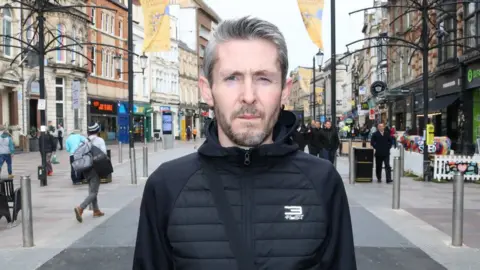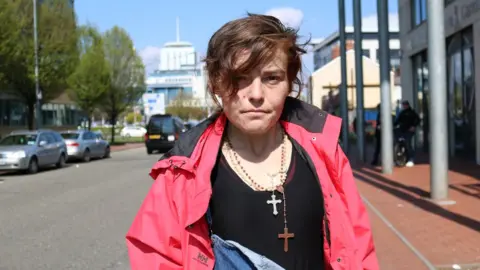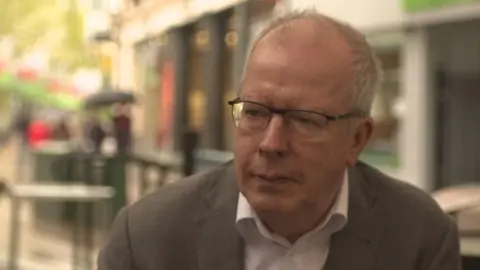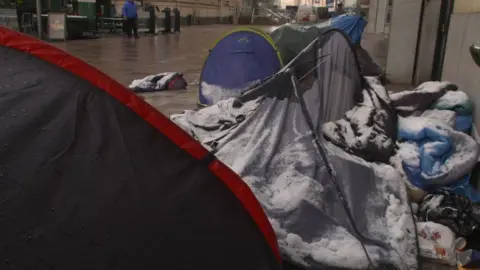Cardiff's homelessness problem 'could be solved now'
A Finnish scheme which has dramatically cut rough sleeping could help the problem in Wales, according to the expert behind it.
Housing First gives people a permanent flat without setting conditions like giving up alcohol or drugs first.
Juha Kaakinen says it could work here, but thinks there is a "lack of focus" in Wales.
Julie James, the minister responsible for housing has admitted the current system was "not fit for purpose".
Speaking to Claire Summers on BBC Radio Wales, she announced a new taskforce between Cardiff prison, the Welsh Government and Cardiff council to stop "people who are going in and out of prison all the time".
"We are going to go into that prison, three weeks before people are released to make sure they have accommodation plans coming out," Ms James said.
BBC Wales Investigates has spent the past five months looking into homelessness in Cardiff and meeting people who say they are stuck in a cycle they cannot escape from.
Over recent years, the number of people sleeping rough has gone up dramatically. The latest estimate from the Welsh Government is there are about 100 people sleeping on the streets in the city.
Across Wales, an estimated 90 homeless people have died in the past five years.
When people walk past tents on the streets and parks of Cardiff city centre, they might think the people inside are somehow different to them. Del Clarke proves this is not the case.

Mr Clarke had a home, a job in nursing which he enjoyed, a partner and a son, but when his drinking got our of control, his life began to unravel.
"I ruined everything. I lost my job and I lost my place. I've got a little boy I haven't seen in quite a while. I want to get back dry and see him because I miss him so much," he said.
"I had a regular life, the whole lot. As I say to everybody - you're only one pay cheque away from being homeless."
Everyone has their own reason for being on the streets, for Christina it was running away from home.
She is a classic example of how someone can get trapped in a homeless existence despite all the support available.

"I ended up coming down here (to Cardiff) in 1994 and I've been homeless ever since.
"I don't want to be living in a tent my whole life, I'd rather be in a nice warm, home with four walls.
"The predicament I'm in is an endless circle. We have to sit out there to get our money for what we need for our day," she said.
Christina, like many people on the streets, suffers from drug addiction.
Hostels 'not for everyone'
The homeless aren't abandoned - there are regular hot drinks supplied by Cardiff council in cold weather, charity soup kitchens and plenty of emergency accommodation at support centres like The Huggard in Butetown. But many people say they prefer sleeping on the streets to being in a hostel.
Justin told BBC Wales Investigates he avoids hostels for his own safety.
"You will probably wake up lucky to still have your trainers. In there the alcoholics were urinating, not on me but near me."
Richard Edwards, chief executive at The Huggard, insists sleeping on a floor space in a hostel is safer than in a tent, but understands why it's not for every homeless person.
"People want their freedom and sleeping in a communal environment can be quite difficult, particularly if people have got mental health problems and substance misuse issues, so it's not an ideal environment," he said.
"We don't want to suggest that emergency accommodation is a solution to rough sleeping - because it isn't."

Solution 'is available'
One country where they appear to have found the solution is Finland, where rough sleeping has almost disappeared because of something called Housing First.
Under the scheme, rough sleepers are given a permanent flat first. There are no conditions, such as giving up drugs or alcohol, but there is indefinite, intensive support.
It sounds controversial. But the evidence suggests it works.
Temporary beds in Helsinki have dropped from 600 to just 52, and rough sleeping has been virtually eliminated.
Currently in Wales people usually have to move from hostels to short-term accommodation before they are allocated a property. They often end up back on the streets during the day with nowhere to go and vulnerable to their addictions.
If Housing First was introduced in Wales it would be a big change, but according to Mr Kaakinen, a leading international housing expert behind the Finnish scheme, it saves money.
"We have a study in Finland which shows when you have long-term housing for homeless people with support, the savings are around €15,000 (£13,000) per person in a year. In the long run the cost savings get bigger if people get back into employment and get their life on track," he said.
And Mr Kaakinen thinks much more could be done in Wales, and the government is dragging its feet.
"There's a lack of vision, there's a lack of focus on ending homelessness," he said.
"There are different ways to manage the current situation and get on with it - but there's no consistent effort towards ending homelessness."
In Wales there are several Housing First pilot projects all showing the same success rates at getting people off the streets permanently.
Mr Kaakinen says he does not understand why the Welsh Government has not rolled out the programme to everyone who needs it.

'Not fit for purpose'
Julie James is the minister in charge of housing in Wales. She admits the Welsh Government has had the evidence that Housing First works for years but that such a big change takes time to implement.
"The present situation is not fit for purpose and we clearly need to rejig the system so we do not see people sleeping rough on the streets of Cardiff.
"You're shifting the whole ship round and it's not something you can click your fingers and do - we do need to make sure that when we do it, it works.
"I think emotionally Housing First sounds right, but it's important to make sure that we've got all the practical details right."

Living Rough: Life on the Streets, BBC One Wales, 20:30 BST, 13 May and on the BBC iPlayer
